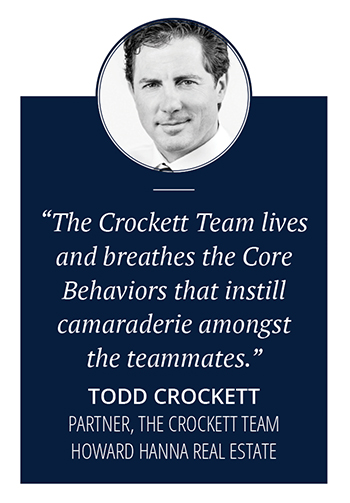And How the Best Have Gone From Startup to Powerhouse
Editor’s Note: This is the cover story in the February issue of RISMedia’s Real Estate magazine. Subscribe today.
 While the growth of agent teams has been prolific in the last decade, and the effectiveness of the team model has been proven many times over, the art of forming, operating and succeeding with an agent team is complex, and requires dedication and a commitment to changing with the times.
While the growth of agent teams has been prolific in the last decade, and the effectiveness of the team model has been proven many times over, the art of forming, operating and succeeding with an agent team is complex, and requires dedication and a commitment to changing with the times.
As teams have evolved, so have the dynamics of creating and running a winning agent team. Ten years ago, RISMedia published “Power Teams: The Complete Guide to Building and Managing a Winning Real Estate Agent Team.” Although teams are still defined in much the same way—two or more agents working together for a common purpose—what has changed is the staggering amount of business today’s Power Teams are closing, the rising sophistication of their professional and operational skills, and their adaptation of the latest technology and marketing resources.
That’s why RISMedia has also evolved its coverage and offering for agent teams, whether you’re just exploring the team concept or whether you’re ready to take your team to the next level. In RISMedia’s Ultimate Real Estate Team Guide, by RISMedia Associate Content Editor Liz Dominguez, we interview many of the nation’s most successful real estate teams to uncover their best practices for winning with the team model in today’s real estate environment.
RISMedia’s Ultimate Real Estate Team Guide is just one facet of our ongoing coverage for and about Power Teams in 2019. You can find more in our weekly Team Tuesday enewsletter, filled with team profiles, trends and business development strategies designed specifically for team success.
The team structure brings with it many high-level challenges, all of which can be tackled head-on with the proper tools and by taking the necessary steps to protect and educate yourself and your team. RISMedia’s Ultimate Real Estate Team Guide helps you address these challenges through our research and the expert insights of top-performing teams across the country. Remember, in the world of real estate teams, there is no one-size-fits-all solution; however, the path ahead will be easier and more successful for those who educate themselves. Following are excerpts from the first volume of the Ultimate Real Estate Team Guide.
 The Legalities of Forming a Business Entity
The Legalities of Forming a Business Entity
Forming a team can have myriad advantages for all agents involved; however, it is a complex process that involves a lot of legal consideration.
Sara Guldi, REALTOR® and owner of The Guldi Group at Keller Williams Realty in Maryland and coach at Workman Success Systems, manages a team of eight, including her administrative and support staff.
“When we formed the team, there were no real state guidelines, so we followed what we had learned from our broker, made sure we were in compliance with general real estate state laws and called the legal hotline for input whenever needed,” says Guldi. “When our state did issue guidelines, we had to make mostly small adjustments.”
Before forming a team, agents must consider how they’ll register it as an official business entity, as it will not be legally valid until this is done.
“We have been an S corp for the past 11 years, formerly an LLC. At the advice of our accountant, we switched to the S corp for a more favorable tax situation,” says Leigh Reed, senior vice president/partner of Heller Coley Reed at Long & Foster Real Estate. “Once the S corp paperwork was drafted, before it was filed with the state, we did have to pass it through the Long & Foster legal department to be sure we had their blessing, so they would be able to pay us as a corporation.”
Reed has worked in the real estate industry for 30 years. Her team is made up of three partners, three staff members, one assistant and 11 agents.
When it comes to teams that work in more than one state, the legalities of broker-imposed regulations can become a little more complex. Guidelines vary between states and are changing quickly.
“In Maryland, we do have a few extra layers of broker supervision that do not yet exist in Washington, D.C., or Virginia,” says Reed. “Some of this has to do with advertising rules in Maryland relative to team disclosure, and some is the contract law that forms the legal chain from the individual agent in a transaction, to their team leader or associate broker, to the sales office manager, to the state broker of record.”
 Setting Expectations and Goals With Core Values
Setting Expectations and Goals With Core Values
Although not always written out, core values are a set of goals and rules by which all companies run their business. When forming a team, these values can be the glue that holds all members together.
Most teams use their core values as a type of contract by which their agents must abide. Jeff Ruff, co-owner of Vutech | Ruff at HER Realtors®, formed his team in 1993 with his business partner, Marilyn Vutech. The team currently has 11 licensed agents.
“We look for team members with very good communication skills,” he explains. “We are very specific about the personalities of our team members and their work ethic, as the reputation of each person is critical to our team’s reputation.”
Todd Crockett, partner at The Crockett Team of Howard Hanna Real Estate, has worked in real estate for 40 years, 24 of which have been spent on a team. Currently, he manages a team of 20 agents, a marketing manager, a listing service manager and two closing coordinators with his wife, Judie, as his partner. The Crockett Team Core Behaviors were created as the team evolved, focusing around six guiding behaviors that set them apart from the competition: Collaboration, Innovation, Adaptation, Implementation, Clarification and Reiteration.
“The Crockett Team lives and breathes the Core Behaviors that instill camaraderie amongst the teammates,” says Crockett.
Tackling Financial Challenges
Knowledge is power when it comes to numbers; therefore, it is imperative that team leaders stay up-to-date on finance language and the diverse options available for payroll, accounting, bookkeeping, etc.
“We keep it very simple. Selling members are given a percentage of every deal and support members are paid hourly, plus bonuses on each listing and each closing. This way, everyone has skin in the game and stays excited,” says Steve Abbe, co-team leader of Abbe/Mullinnix Distinctive Properties at Coldwell Banker Global Luxury in Florida. “The support members are paid as independent contractors, so we 1099 them each year.”
Teams have different approaches to tracking their finances. Many newer or smaller teams prefer to take on more responsibility themselves.
 Abbe prefers to take on a portion of the financial tracking, as it is manageable for his team of three selling agents and two support staff members. However, he delegates the accounting responsibilities to a professional.
Abbe prefers to take on a portion of the financial tracking, as it is manageable for his team of three selling agents and two support staff members. However, he delegates the accounting responsibilities to a professional.
Cleve Gaddis, broker/managing partner of Gaddis Partners of RE/MAX Center, believes it is necessary to seek professional help with some components to ensure the business stays profitable. “We have a part-time bookkeeper/accountant who also keeps the books for our property management company,” says Gaddis. “I had owned several businesses in the past myself, so setting up payroll and other financial systems wasn’t really different than other businesses. We used a payroll service for the first few years and now we handle payroll in-house.”
The real estate industry can be unpredictable at best when it comes to making sales throughout the year; therefore, most teams are committed to monthly business tracking. “It’s not a yearly plan; it’s a monthly plan. We need to know exactly what we are projecting per month and what we have actually closed,” says Collette McDonald, president of Collette McDonald & Associates at RE/MAX Around Atlanta. “My company holds a minimum of six months of operating expenses so that we can adjust when market conditions fluctuate.”
Of course, determining what the numbers are is not enough. Once spending and revenue are tracked on a monthly basis, teams must formulate budgets and business plans based on the trends they see in their financial history.
“We try to use percentages as much as possible in setting budgets. As an example, we want our marketing, lead generation and conversion costs for buyer clients not to exceed 25 percent of the company dollar,” says Gaddis.
In addition, adjusting to changes in the market and changes to the team’s spending should be part of everyone’s business plan.
“Real estate is a little bit different because one year can have very little to do with the next year,” says Abbe. We found that we are constantly adjusting our budget. In real estate, the budget has to be a ‘living document.'”
And with more experience comes increased elasticity in business planning and budgeting.
 “My budget evolves with the market,” says McDonald. “I know exactly what I have to close in order to pay the bills based on the last four years of expenses. Expenses change, but from experience, I know the range we have to make in order to stay at the level we are at and grow 5 percent per year.”
“My budget evolves with the market,” says McDonald. “I know exactly what I have to close in order to pay the bills based on the last four years of expenses. Expenses change, but from experience, I know the range we have to make in order to stay at the level we are at and grow 5 percent per year.”
Successful Marketing and Profitable ROI
Every new marketing product introduces a learning curve, not only to use the service, but also to determine how many leads it generates and if those leads turn into profits. The real estate industry heavily relies on lead generation and conversion, and so marketing sources must be analyzed carefully, or business owners risk losing money and time—two of the most valuable assets for a real estate team.
But how is the value of a product determined? There are many factors, but return on investment (ROI) is the most significant. Each team has to determine which products work best for their unique format and business style. In order to do this, they must first identify their team’s source of business—what makes them run and what drives profits.
“We use a variety of marketing tools, including ‘For Sale’ signs; open houses; ‘Just Sold’ postcards; personal Facebook posts and paid business page Facebook posts; 9,000 farming emails every other month; SEO with my world-class website; obtaining testimonials on Zillow, Trulia, realtor.com®, Yelp, Google and Facebook; email blasts; and a variety of print advertising directing people to my website,” says Mike McCann, associate broker of The Mike McCann Team with Keller Williams Realty Philly, who is known as “The Real Estate Man.”
“Our marketing expenses incorporate so many different products, systems and tools that are all necessary to invest in,” adds McCann. “In this day and age, you have to be everywhere. You can’t hone the market on just one site or by using just one tool. You have to dip into your pockets on every source of possible lead generation.”
Lindsey Gudger, co-founder, with Jason Gasbarra, of The Every Door Team at Every Door Real Estate, has worked in real estate for four years, and lead generation sticks out clearly as his team’s most successful marketing venture.
“Lead generation, hands down,” says Gudger. “We spend the vast majority of our marketing budget on generating online opportunities—around $80,000 per month.”
Once a profit source is identified, teams must find a vessel that works alongside it to create efficiency, streamline the process and provide results. This can be found in a third-party product or in technology offered through the brokerage.
 Whether the need is a CRM, a dialer, a social media presence or an online lead profile, it is imperative that team members research all possible avenues before deciding on a product.
Whether the need is a CRM, a dialer, a social media presence or an online lead profile, it is imperative that team members research all possible avenues before deciding on a product.
“I have trusted team members who bring the innovation to me when they hear of products they think can benefit our team,” says McCann. “Often, I will try new things to see if they generate leads.”
Sometimes, the best research comes in the form of recommended services that have been successfully implemented by other teams.
“Most of the new products we look at come to us through private social media groups where top performers share what’s working for their teams,” says Gudger. “When it comes to evaluating the vehicle, it’s all about the consumer experience.”
A trial period is necessary to determine whether a marketing product is providing the necessary results, not only to generate leads, but also to pay back all expenditures. These trial lengths vary by team, lasting anywhere from a few weeks to a year.
In terms of lead conversion, scale may play a role in timing, as well.
“Scale is a separate issue. Does the vendor have enough consumer traffic to generate enough leads? We feel that a six-month trial is the only real way to assess this aspect,” says Gudger. “You’ll have leading indicators in as little as three months, but a test less than six months isn’t going to give you a big enough sample size to truly evaluate a new vehicle.”
Marketing strategies should be discussed at recurring team meetings and adjusted accordingly to adapt to changes in the industry.
“A busy inbox of incoming leads does not mean you have a strong ROI. We’d happily use a vehicle that provides just a handful of leads per month assuming the return on investment is there,” explains Gudger. “You can’t feed a team off a vendor like this, but if you have the right systems in place, a handful of providers with this profile can absolutely build a strong business.”
RISMedia’s Ultimate Real Estate Team Guide will be available for purchase in print and online in the coming weeks.
 Maria Patterson is RISMedia’s executive editor. Email her your real estate news ideas at maria@rismedia.com.
Maria Patterson is RISMedia’s executive editor. Email her your real estate news ideas at maria@rismedia.com.












